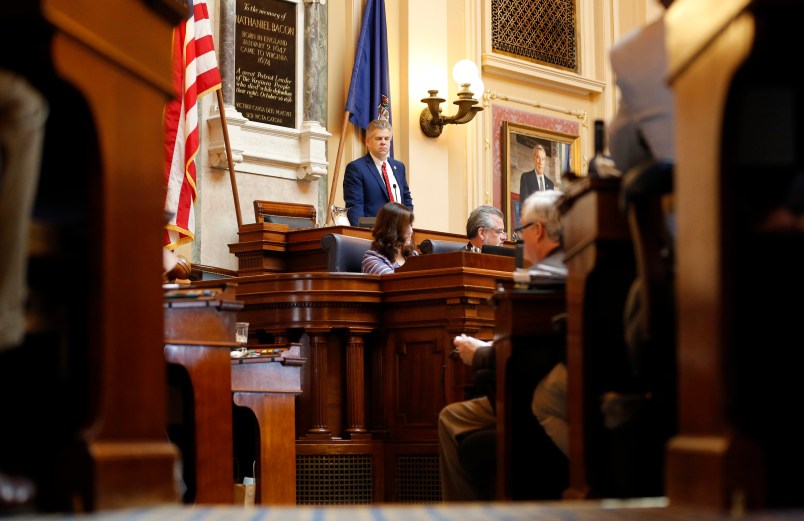RICHMOND, Va. (AP) — A panel of federal judges has chosen a redistricting map for Virginia’s House of Delegates that could shift some districts toward Democrats and help the party gain control in this year’s election.
The judges ordered a new map in June after ruling that lawmakers had racially gerrymandered eleven House districts by packing black voters into them.
On Tuesday, the judges chose new district lines from a series of proposals submitted by a special master. The judges gave all sides until Feb. 1 to file objections.
An analysis of the maps by the nonpartisan Virginia Public Access Project shows the plan could shift six Republican-held districts toward Democrats, including the district of House Speaker Kirk Cox, which would become 32 percent more Democratic.
Cox called the redistricting modules chosen by the court “legally indefensible” and said they attempt to “give Democrats an advantage at every turn.”
“The modules selected by the Court target senior Republicans, myself included, without a substantive basis in the law,” Cox said in a statement.
The U.S. Supreme Court is scheduled to hear the GOP’s appeal this spring. The high court rejected a request from Republicans to put on hold the lower court’s ruling, which means the election season will begin using whatever map is finalized by the lower court.
Cox said that no matter what happens with the redistricting “Republicans are prepared to defend and rebuild our majority in the House.”
Republicans now hold a 51-48 majority in the House, with one additional seat to be decided in a special election next month.
The Virginia Public Access Project calculates that the maps would move between 370,000 and 436,000 voters to new districts. The eleven districts that were found to be gerrymandered were mostly in the Richmond and Hampton Roads area.
University of California, Irvine political science professor Bernard Grofman was chosen as a special master after the GOP-controlled General Assembly and Democratic Gov. Ralph Northam were unable to reach an agreement on a redistricting plan. Grofman has said redrawing the lines of the districts also affected some surrounding districts, resulting in a total of 26 districts being redrawn.
In addition to Cox, Del. Chris Jones, R-Suffolk, chairman of the House Appropriations Committee, would see a sharp Democratic shift of 27.4 percentage points in his district, under the Virginia Public Access Project’s analysis.
Del. David Yancey, R-Newport News, whose 2017 re-election was so close the winner was decided by picking a name out of a ceramic bowl, would also see a significant Democratic shift — 13.6 percentage points— in his district, under the access project’s analysis.
Jones and Yancey did not immediately return calls seeking comment Wednesday.
Democrats made huge gains in the 2017 election, taking 15 seats away from Republicans. All 100 House seats will be on the ballot in November.
Marc Elias, an attorney who brought the redistricting lawsuit on behalf of a group of African-American voters, did not immediately return a call seeking comment Wednesday.
After the court announced its choice of maps Tuesday, Elias said on Twitter that the decision adopts the configuration the group advocated.
“We are one important step closer to the end of the GOP’s racial gerrymander,” Elias tweeted.







The south will fall again…
Of course the new map had to favor Democrats. The old map so favored Republicans that anything that balanced scales and undid the extreme gerrymandering that gave them that advantage in the first place would favor Democrats. Republicans think that their cheating is the only fair way to do things!
Ooh, that’s gonna leave a mark.
So what will the supremes do? If they hear arguments this spring, can the gang of five declare that racism is over in virginia soon enough to go back to the old district lines without interfering with the election? In cases going the other way, the deadline for changing district lines has been way early.
Dear Mr. Speaker: Tell it to the judge(s). More GOP victimhood. As always, IOKIYAAR applies.